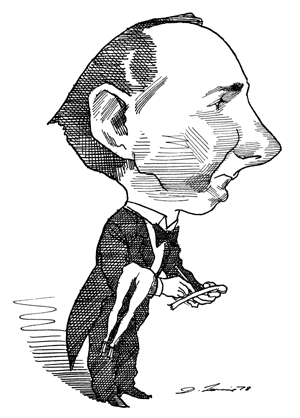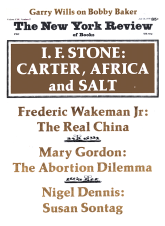So this gentleman said a girl with brains ought to do something else with them besides think. And he said he ought to know brains when he sees them, because he is in the senate and he spends quite a great deal of time in Washington d.c. and when he comes into contract with brains he always notices it.
—Anita Loos, Gentlemen Prefer Blondes
Pimp to the Senate is not a title turned very readily into a boast. But somehow Larry King gives Bobby Baker just the right Lorelei Lee tone of voice. The book should be called A Guy Like I. Senators just kept shoving money into his hand. His stance is half swagger, half sulk—a blending of goniff with gofer. The affronted air of one who stood by his deals is perfectly sincere: he is shocked when people won’t stay bought. I met Mr. Baker while I was reading his book, and remarked that he is surprisingly candid about his own actions—which included special delivery of a call girl to the home of a senator in need. “You have to give value for money,” he said. It was his creed on the Hill, and it explains his success even in jail, where he was a principal ornament of Allenwood’s chapter of the Jaycees.
Senators need pampering. They have the egos of movie stars. That comes out even in Bernard Asbell’s rather fawning book, centered on Edmund Muskie. Asbell notes that Muskie uses his height theatrically—choosing a chair for TV that put his belly button up above the desk, putting none but short men on his staff. Bobby Baker’s major insight, achieved in his teen days as a Senate page, was that it is impossible to praise a senator too much. His period of service to Lyndon Johnson is perfectly captured in the fact that he seems to have begun every sentence with a verbal salute. He did not call him Senator or Mr. Johnson or Sir, but “Leader.” The senator did not stop, of course, to consider what that title is in German.
One can safely skip the childhood chapter in Baker’s book, which lacks the economy of Lorelei’s account while retaining its point: “It would be strange if I turn out to be an authoress. I mean at my home near Little Rock, Arkansas, my family all wanted me to do something about my music.” But once he hits Washington, Baker is quick to ingratiate himself. In time, avoiding Bobby Baker’s friends list would become as imperative as joining Richard Nixon’s enemies. Among friends mentioned here, the resolutely tall Senator Muskie of Asbell’s book is shown receiving emergency campaign funds from Baker’s service. Elsewhere Bobby Baker gives Bobby Kennedy an envelope with $10,000 in Murchison money from Texas for the 1960 campaign. Later, when Baker’s troubles began, he says, a German beauty named Ellen Romesch was swiftly deported by Attorney General Kennedy, with a trusted aide to escort her and keep her mouth shut. The charge was that Mrs. Romesch had been made available to senators at one of Baker’s command posts, the Quorum Club, and that she also had an affair with a Russian diplomat. What did not come out at the time was the news that one senator who sought her company by way of Baker had since then become president of the United States. It seems there was a Judith Exner before Judith Exner, playing musical beds with the Russians instead of the Mafia.
Baker has less to reveal about Lyndon Johnson than some have feared or hoped—a kickback here, an affair there. Johnson was too stingy to cut Baker in on his financial deals. “When it got down to the licklog, friendship with Lyndon Johnson was a one-way street.” But what should one expect when one came in, always, to shine the boots of one’s “Leader”? What Baker supplies is a glimpse of the fear under Johnson’s swagger. Much of his skill at Senate maneuver came from an “overkill” need to have all-or-nothing support. He could never risk losing—which explains his withdrawal from the 1968 race. Even the remotest possibility of losing to the hated Robert Kennedy was more than he could face.
Baker has a con man’s natural gift for seeing through other people’s acts, and he shrewdly notes that “Ike, one of the better political generals the army has produced, may have sometimes out country-boyed Lyndon Johnson when [Majority Leader] Johnson didn’t know it. Ike, too, was a fine actor and not a bad manipulator of men.”
Baker’s rise and fall were not the result of his ties with Johnson. They came from errands run for his father-idol of power and money, Robert Kerr of Oklahoma. Kerr died with two million dollars of loose cash in his office, and there is an obvious connection between that fact and Baker’s considered judgment that Kerr “had the finest mind of any I knew in public life, and I do not make exceptions for Lyndon Johnson, Jack Kennedy, or anyone else.” Kerr, quick and businesslike in bribes, once told Baker, “A man who doesn’t have money can’t operate. Why, if I don’t have at least $5,000 on me as pocket change, I’m afraid that taxi drivers won’t pick me up.”
Advertisement
Baker’s book throws light on Nixon’s memoirs, and takes back reflected light. Baker has now joined people like Hiss and Howard Hughes among Nixon’s obsessions. Three times Nixon reflects in his book on the unfairness of Democrats in the Congress: they covered up (he says) the Baker scandal for Johnson, and then refused him the same courtesy. But in a fourth place—a diary entry from 1972—Baker suddenly emerges as the source of up-to-date information about Lyndon Johnson’s last days. A number of anecdotes—and some flattery of Nixon—are reported as Bobby Baker’s. How and why was Nixon communicating with Baker?
The answer to that question shows how desperate Nixon was to get something on Larry O’Brien—the reason for the Watergate break-in in the first place. O’Brien represented the Kennedys for Nixon; he was both a danger and an opportunity because of his ties with Howard Hughes. In August 1972, Nixon people threatened Baker with new trouble from the Justice Department. Then, on Labor Day, Baker got a call from Bebe Rebozo, summoning him to Key Biscayne—it was so important, Rebozo said, that Baker must come at once, even though Baker was on his way to his mother’s funeral. At Key Biscayne, Rebozo got right down to business—what did Baker know about O’Brien that could help elect Nixon president? “We need to nail O’Brien. Have you heard anything about what really happened at Chappaquiddick? Did O’Brien play a big role in that?” Baker said he had nothing to give, and tried to steer Rebozo to other scandals where he might make a contribution. But Rebozo wanted O’Brien or Ted Kennedy.
After his mother’s funeral, Baker got another call from Rebozo to set up a meeting with Herbert Kalmbach. “Herb Kalmbach seemed almost desperate to uncover dirt involving Larry O’Brien…. Kalmbach said, ‘Tell me about the TFX fix…did O’Brien have anything to do with the TFX decision?…Do you have anything on him from the Johnson era?”‘
It is clear that Rebozo’s peremptory contact with Baker was ordered by Rebozo’s friend, who acquired his anecdotes about Johnson when Rebozo reported back. The threatened prosecution of Baker was just another in the endless list of Nixon’s dirty tricks—once again justified on the grounds that the target of his scheming had “got away with” prior schemes that hurt Nixon.
There is another connection between the Nixon and the Baker books. Several times in his memoirs Nixon dwells on a mysterious comment Johnson made to him while showing him around the White House—that Nixon should trust and work with J. Edgar Hoover, because Johnson could not have become president but for Hoover. Now, in Baker’s book, we hear what Johnson told Baker during their last days together.
“J. Edgar Hoover came to me shortly after I became president and said he had electronic evidence that you were mixed up with a bunch of Las Vegas gamblers. He warned me against lifting a finger to help you. I felt helpless.”
The Baker scandal arose in the fall of 1963, just when Johnson succeeded to the presidency. There was urgent need for Johnson to cut ties that could embarrass his 1964 campaign. That, presumably, was the way Hoover helped Johnson become president in his own right—and another of the ways Hoover let his chiefs know what he had on them. In context, Johnson’s counsel that Nixon should trust Hoover becomes an ambiguous bequest. In fact Nixon could not, finally, trust Hoover because he ceased to be devious enough.
The Nixon and Baker books would make good companion reading if Nixon’s made good reading at all. But the ex-president’s suspicious style is less convincing that the ex-convict’s complacent one. Nixon said “I am not a crook” and commanded disbelief. Baker says “I was only a crook” and engages sympathy—something about whores entering heaven before Pharisees. When Baker built his senatorial bilkees a pleasure palace called “The Carousel,” he gave them value—an ocean view: “Nothing makes gentlemen get so definite as looking at nature when it is moonlight.” Baker is righteous about not “ratting” at his hearings and trial, and even that sounds better than the whining of a president who could not stand trial.
Advertisement
Everyone at the trial except the District Attorney was really lovely to me and all the gentlemen in the jury all cried when my lawyer pointed at me and told them that they practically all had had either a mother or a sister.
Asbell’s book also makes informative reading in conjunction with Baker’s, even though The Senate Nobody Knows just gives more detail about the Senate everyone who cares at all does know. Asbell assures us that “the new Senate” is not a place for cloakroom deals; but his obvious thrill at admission to Muskie’s Capitol “hideaway”—Room “S-199,” the symbol of collegial power—matches Bobby Baker’s pride at attending “Mr. Sam’s Board of Education,” the Rayburn inner sanctum. Asbell writes:
Dolores summons Jim Case, instructing him to take the case pleader to S-199. She calls after him in a full-voice whisper, “I don’t know when the Senator’ll get there. Pour the guy a sherry or mix him a drink. He’ll like that….” Actually, I have changed the room number. To reveal the correct number would be an unforgivable breach of Muskie’s trust, indeed of Senate tradition. Hideaway numbers are not published anywhere. The phone extension number is so secret that Dolores Stover will not permit it to be written down anywhere in the Senator’s office. If an aide ought to know it, he or she memorizes it. The fact is that even Senators do not necessarily know which other Senators have hideaways and where they are. When a Senator “comes of age,” the sergeant at arms, on behalf of the Rules Committee, slips him a key.
In short, boys will be boys—so there will always be Bobby Bakers, more or less talented.
Asbell recounts in killing detail the story of one bill, Muskie’s Clean Air Act. Even environmentalists will have trouble justifying the death of trees felled to bring them this dull praise of clear water and sky. Asbell has some good Senate gossip, but it is less lethal (so less lasting) than Baker’s—and the last word belongs to Lorelei:
I mean it was quite amuseing in spots because it was really quite riskay but the spots were not so close together and I never seem to like to always be hunting clear through a book for the spots I am looking for, especially when there are really not so many spots that seem to be so amuseing after all.
This Issue
July 20, 1978




